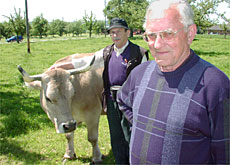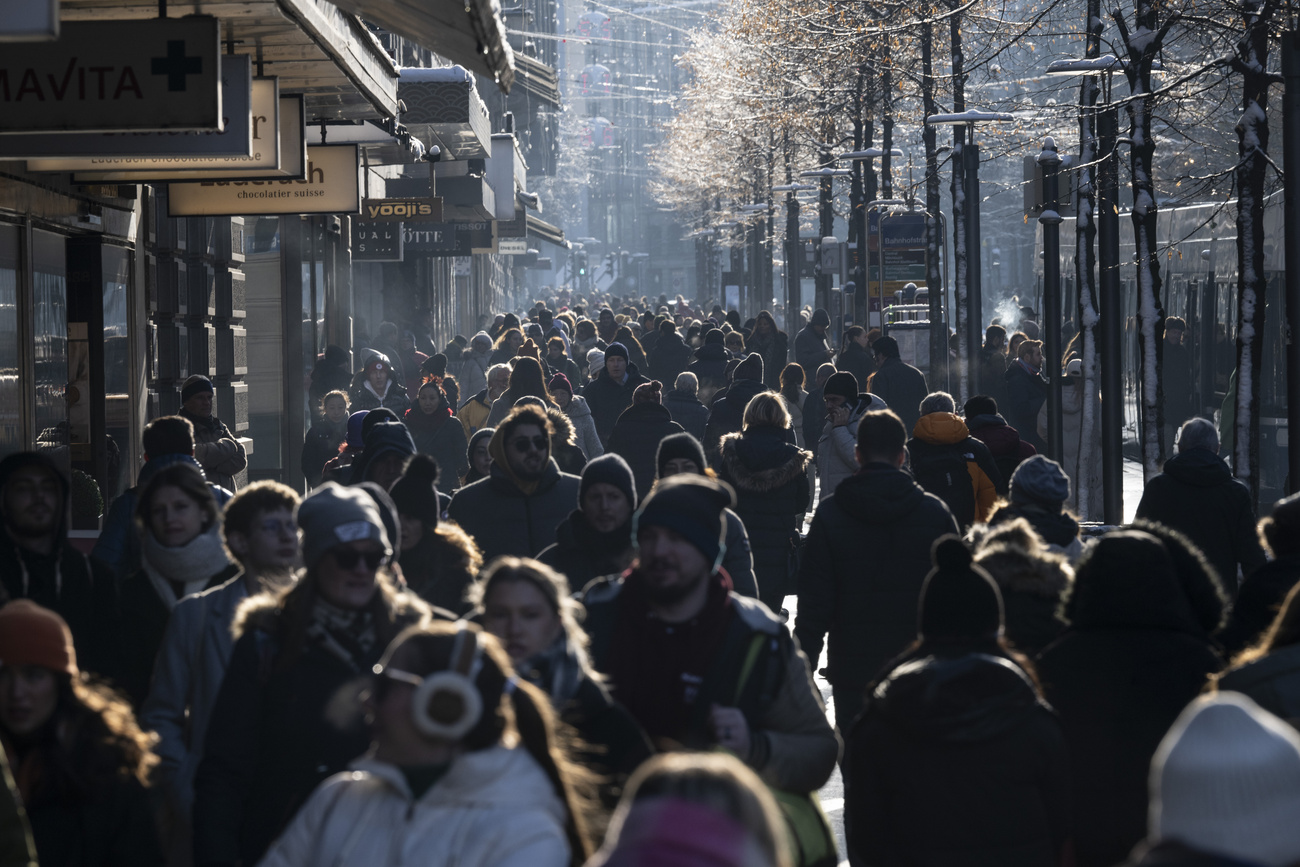
Rescued cows live out their days in clover

Half a dozen old cows graze peacefully on a small farm in eastern Switzerland, unaware of how lucky they have been to escape the slaughterhouse.
They are benefiting from a unique partnership between animal rights groups and farmers to provide a home for cows past their prime.
Kassja, Sara and friends continue to chew the cud in the shade of the farm’s apple trees, unbothered by the cameras and microphones.
They have been the focus of numerous stories in the Swiss press since Kassja became the first Swiss cow to have been granted a stay of execution and allowed to live to a ripe old age on a retirement farm.
Kassja was saved at the last moment when a teacher and his primary school pupils visiting her farm near Schaffhausen learned of her fate.
Charmed by her friendly nature, the teacher bought Kassja but not knowing what to do with a cow, promptly contacted the regional animal rights organisation for advice.
Long live the cow
What resulted was the Viva la Vacca (long live the cow) project, a sort of animal-friendly clearinghouse for unwanted bovines.
The animal rights society finds farm homes for cows past their productive age and sponsors willing to fund their keep.
“The cow owners contact us because they have an animal they don’t want to see slaughtered,” says Reinhold Zepf, president of the society and the driving force behind Viva la Vacca.
“Many of the sponsors are from cities and towns, but they grew up on farms and so they have a soft spot for animals,” Zepf continues.
About a dozen cows have already benefited from the project and half of them, including Kassja, now live undisturbed on the farm of Paul Oswald in the hamlet of Sommeri, west of St Gallen.
Oswald is paid SFr200 ($160) a cow each month but he says that is only enough to cover his costs.
Bear fruit
“We were just about to give up our small dairy operation when we heard about the project,” says Oswald, who now makes a living from his extensive apple orchards.
“We were interested in getting involved since we’ve always liked animals,” he continues.
However, Oswald has been criticised by some of his peers who are uneasy about his decision to side with animal rights organisations, which are seen as a thorn in the side of farmers for demanding more humane treatment of livestock.
“They say the sponsors’ money would be better spent on starving children in Africa,” Oswald says.
“But they are also envious since they think we are making money for doing next to nothing, while they have their hands full with their dairy farms.”
Rescue
But Oswald does not think Viva la Vacca will be able to rescue many old cows from the slaughterhouse.
“Even though butchers only pay between SFr300 and SFr800 for a cow, that’s money farmers can’t afford to do without,” Oswald explains.
“That’s why they are not willing to hand over animals which have faithfully given milk for years, even if the alternative is the slaughterhouse.”
The few farmers who could not bear to see their cows killed often come to visit the elderly beasts.
“They tell me how their cow produced over 10,000 litres of milk, and gave birth to ten calves, or how their animal was affectionately known as the village cow, since it was taken along to every event in the community.”
Reinhold Zepf says he is surprised that there has not been a project like Viva la Vacca before.
Swiss icon
“Cows are cultural icons in Switzerland,” Zepf says. “The cow is omnipresent in the naïve art of the Appenzell region and even in Zurich or Bern, where you see cow motifs in shop windows everywhere.”
Zepf believes the project creates only winners, yet he realises that Viva la Vacca has limited scope.
“Someone once told me there are maybe twice as many cows in Switzerland as people. He wanted to know if we wanted to care for every cow in the country – what a question!”
swissinfo, Dale Bechtel in Sommeri
Founded in 2002, Viva la Vacca finds farms for old cows whose owners don’t want them to be slaughtered.
Sponsors are sought to pay for their keep.
There are currently 12 cows benefiting from the project, distributed among three farms in eastern Switzerland.
Each “retired” cow costs SFr200 ($160) a month to keep.

In compliance with the JTI standards
More: SWI swissinfo.ch certified by the Journalism Trust Initiative





























You can find an overview of ongoing debates with our journalists here . Please join us!
If you want to start a conversation about a topic raised in this article or want to report factual errors, email us at english@swissinfo.ch.